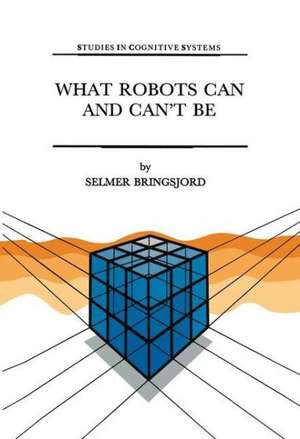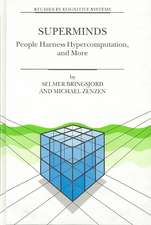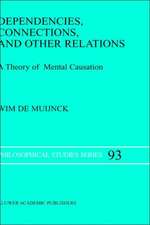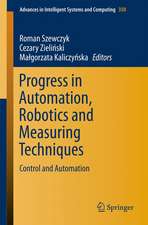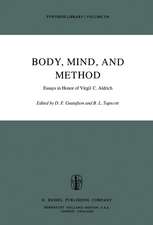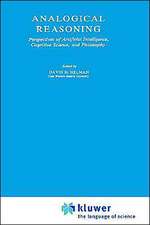What Robots Can and Can’t Be: Studies in Cognitive Systems, cartea 12
Autor Selmer Bringsjorden Limba Engleză Paperback – 5 noi 2012
| Toate formatele și edițiile | Preț | Express |
|---|---|---|
| Paperback (1) | 1042.91 lei 38-44 zile | |
| SPRINGER NETHERLANDS – 5 noi 2012 | 1042.91 lei 38-44 zile | |
| Hardback (1) | 1228.77 lei 6-8 săpt. | |
| SPRINGER NETHERLANDS – 30 apr 1992 | 1228.77 lei 6-8 săpt. |
Din seria Studies in Cognitive Systems
-
 Preț: 401.79 lei
Preț: 401.79 lei -
 Preț: 364.14 lei
Preț: 364.14 lei - 15%
 Preț: 643.48 lei
Preț: 643.48 lei -
 Preț: 360.58 lei
Preț: 360.58 lei - 18%
 Preț: 1228.77 lei
Preț: 1228.77 lei - 18%
 Preț: 1231.78 lei
Preț: 1231.78 lei - 20%
 Preț: 1907.46 lei
Preț: 1907.46 lei - 15%
 Preț: 645.28 lei
Preț: 645.28 lei - 18%
 Preț: 1222.49 lei
Preț: 1222.49 lei - 18%
 Preț: 1232.57 lei
Preț: 1232.57 lei - 18%
 Preț: 954.77 lei
Preț: 954.77 lei - 15%
 Preț: 645.79 lei
Preț: 645.79 lei - 20%
 Preț: 1913.75 lei
Preț: 1913.75 lei - 18%
 Preț: 951.47 lei
Preț: 951.47 lei - 15%
 Preț: 645.60 lei
Preț: 645.60 lei - 15%
 Preț: 646.11 lei
Preț: 646.11 lei - 15%
 Preț: 643.84 lei
Preț: 643.84 lei - 18%
 Preț: 952.40 lei
Preț: 952.40 lei - 20%
 Preț: 335.36 lei
Preț: 335.36 lei - 20%
 Preț: 438.39 lei
Preț: 438.39 lei - 15%
 Preț: 647.40 lei
Preț: 647.40 lei - 18%
 Preț: 950.63 lei
Preț: 950.63 lei - 15%
 Preț: 653.98 lei
Preț: 653.98 lei - 18%
 Preț: 957.75 lei
Preț: 957.75 lei - 18%
 Preț: 944.19 lei
Preț: 944.19 lei - 20%
 Preț: 1282.32 lei
Preț: 1282.32 lei - 20%
 Preț: 339.00 lei
Preț: 339.00 lei - 20%
 Preț: 995.09 lei
Preț: 995.09 lei
Preț: 1042.91 lei
Preț vechi: 1372.26 lei
-24% Nou
Puncte Express: 1564
Preț estimativ în valută:
199.62€ • 216.91$ • 167.79£
199.62€ • 216.91$ • 167.79£
Carte tipărită la comandă
Livrare economică 17-23 aprilie
Preluare comenzi: 021 569.72.76
Specificații
ISBN-13: 9789401050876
ISBN-10: 9401050872
Pagini: 400
Ilustrații: XIV, 381 p.
Dimensiuni: 152 x 223 x 21 mm
Ediția:Softcover reprint of the original 1st ed. 1992
Editura: SPRINGER NETHERLANDS
Colecția Springer
Seria Studies in Cognitive Systems
Locul publicării:Dordrecht, Netherlands
ISBN-10: 9401050872
Pagini: 400
Ilustrații: XIV, 381 p.
Dimensiuni: 152 x 223 x 21 mm
Ediția:Softcover reprint of the original 1st ed. 1992
Editura: SPRINGER NETHERLANDS
Colecția Springer
Seria Studies in Cognitive Systems
Locul publicării:Dordrecht, Netherlands
Public țintă
ResearchCuprins
I: Introduction.- What This Book Is.- Key Theses.- A Note on Ad Hominem Attacks.- Who’s My Audience.- On Doing Philosophy.- Other Arguments Against Theses Like (PERAUT).- The General Plan.- The Cluster Approach.- Connectionism and the Arguments Herein.- What Isn’t In This Book.- Appendix 1I: Argument from Alvin Formalized.- Appendix 2I: Key Theses Mentioned Thus Far.- II: Our Machinery.- Relevant Automata and Their Relevant Properties.- Theses To Which These Considerations Give Rise.- Brief Remarks on Uncomputability.- Pre-Philosophical Data; Ontology.- The Deductive Machinery.- III: Arguments Pro, Destroyed.- The Argument From Analogy.- The Argument From What Should Remain Unexplained.- The Argument From Natural Functions.- Pollock’s Person-Building Arguments.- Cole’s Case for Person Building.- IV: What Robots Can Be.- Sherlock Holmes and Expert Systems.- Computer-Generated Fiction.- V: Searle.- The Argument From Jonah.- Three Objections to the Jonah Argument.- VI: Arbitrary Realization.- First Version of ARA.- Second Version of ARA.- Maudlin’s Olympia Attack.- VII: Gödel.- The Gödelian Argument (Informal).- Weak Objections That Nonetheless Refine the Gödelian Argument.- New Version of Gödelian Argument (Informal).- The Real Problem with the Gödelian Argument.- Is the Gödelian Argument Dead, Then?.- VIII: Free Will.- Determinism and Indeterminism.- Other Concepts; the “Dilemma”.- The Main Argument, for Real.- Iterative Agent Causation.- Main Argument’s Premises Defended.- Objections.- Conclusion.- IX: Introspection.- The Argument from Incorrigibilism.- X: Conclusion.- Index of Illustrations.- Index of Names.- Index of Subjects.
